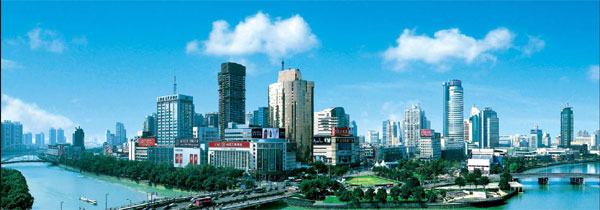Ningbo plans rising tide of port prosperity
|
An aerial view of Ningbo, a port city in eastern China. Photos provided to China Daily |
The nation's second-busiest in annual cargo throughput
The harbor city Ningbo in eastern China is expected to become the core national marine economic zone by 2015 through accelerated development of marine technology, logistics and innovation, according to a blueprint from the local government.
The plan envisions total production in the city from ocean-related industries will reach 450 billion yuan ($72 billion) by the end of 2020 after a modern marine industry system and optimized economic structure are in place.
In addition, the city will boost development of other industries such as logistics, marine biomedicine and energy to increase the value of their output by 40 percent by 2020.
The port at Ningbo is second nationwide only to Shanghai in annual cargo throughput.In the first six months of 2012, total cargo throughput hit a new high of 222 million tons and the number of containers reached 7.8 million, an increase of 10.1 percent, according to statistics from the local government.
In 2011, Ningbo was listed as an important marine economic zone by the State Council. The marine economy strategy helped Ningbo's GDP increase by 7.1 percent to 300 billion yuan in the first six months of 2012.
"We need to seize the opportunity to make our city more competitive among the marine economies," said Wang Huizhong, the Party chief of Ningbo. "The development of industries including shipping, advanced manufacturing and other emerging industries will be given priorities with support policies."
Ningbo has set a goal to build a comprehensive logistic service system based on its deepwater ports, where commodity trading, a sea-land transportation network and a financial information sharing system will be established.
One example is the Beilun district of Ningbo, which can now generate about 1 billion yuan a year handling steel and coal. But by establishing the system for further processing and handling, it can increase the figure to more than 20 billion yuan in revenues.
A series of measures have been implemented to facilitate the sector's growth, many the first in China, such as a listed fund for the marine industry.
The first national marine industry fund was listed on the stock market in 2011 after a marketing operation led by the Ningbo government.
The initial fund will raise 3 billion yuan, mainly from State-owned companies, but the majority will eventually come from the private sector. The fund is expected to exceed 10 billion yuan to be invested in logistics, tourism, manufacturing and emerging marine industries.
"The fund can provide necessary financial support for companies in need and provide a safe and secure investment channel to collect money lying idle in society," said Liu Qi, the city mayor.
Two national conventions on the marine economy have been hosted in Ningbo since 2011. At the first, the China Marine Economy Investment Fair last year, deals for 53 projects were signed for a total investment of 200 billion yuan.
The theme of the second investment fair - developing a knowledge-based marine economy - discussed more measures to cultivate talented professionals.
More than 2,000 technicians from nine local institutes including the School of Marine Sciences at Ningbo University have studied ocean-related subjects and already made contributions in sea farming and other areas.
But the city government realized that it is not enough for the future development and released more measures including bonuses to attract talent from other areas and increasing funding for programs in marine subjects.
More training courses will also be open to fishermen and ship crewmembers.
zhengjinran@chinadaily.com.cn



















